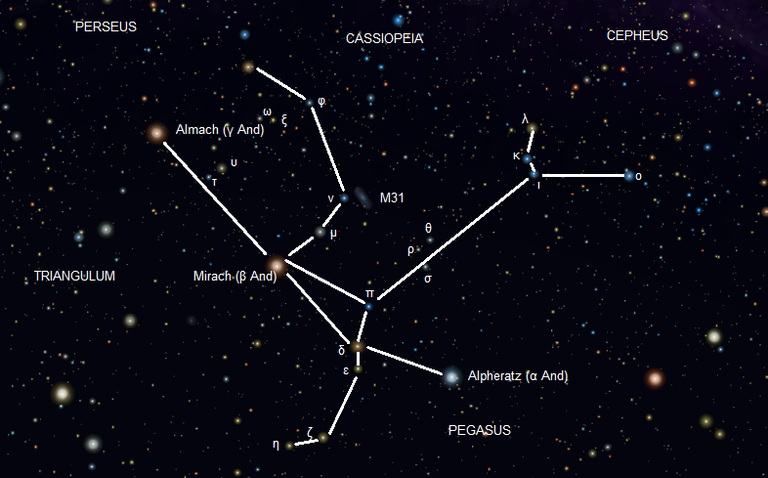Hello! Another deep-sky object that is worth seeing is M31, a large galaxy in Andromeda, this is the brightest galaxy seen from the northern hemisphere. Under the good, dark sky is visible to the naked eye. Let's watch this galaxy closely! I invite you to read.
M31 photography with a long exposure time

By Kees Scherer link [Public domain]
If the night is dark and the weather is good, it can be seen with the naked eye about 3 degrees north of the middle star in Andromeda (mi [μ] andromedae), towards the constellation Cassiopeia. It looks like a gray, longitudinal spot. The 10 X 50 binoculars show an elongated white disk that stretches in the sky to almost 2 degrees. This is a large object, the galaxy in the sky is four times the size of the moon! Unfortunately, its brightness of +3.5 mag makes it an object with low surface brightness. In the middle of the disk is the perfectly visible core of the galaxy. The brightness of the disk gradually decreases towards its edges.
Location of the M31 galaxy in the sky
By User: Keilana, derived from User: Roberto Mura link [CC BY-SA 3.0 license]

Dark, rural skies and 15 X 70 or 20 X 80 binoculars will allow you to find out the true size of M31. When we want to see it through a telescope, we must use the smallest magnification we have (30 to 40X) to capture the largest part of the galaxy in the field of view. Under the rural, dark sky with large binoculars you will see the view as in the picture below.
M31 in binoculars 15 X 70 under a good dark sky

By Lukáš Kalista(reworked by me) link [CC BY-SA 3.0 license]
A telescope with a diameter of 8 "(200 mm) will allow you to see more closely the dark bands around the nucleus. Under the rural sky you will see such a telescope as below. In better conditions, a much larger part of the disk of this huge galaxy will be visible.
M31 in an 8-inch telescope, average conditions

By Brucewaters(reworked by me) link [CC BY-SA 4.0 license]
To the south of M31 lies the M32 galaxy with magnitude +9 mag visible in the telescope as a weak oval (object at left of the top of the photo above). On the other side of the M31 disc, a little further away from it is the galaxy M110 with a magnitude of +8 mag (bottom right part of the photo above). To sum up, M31 is a must-have and I encourage you to see this brightest galaxy of northern sky. I hope these tips will help you.
Greetings to lovers of Astronomy!
Sources:
Andromeda Galaxy
Messier 32
Messier 110
Andromeda (constellation)
and my knowledge...
All rights reserved by @astromaniac 2018
Awesome as ever Kevin. I often go out to look M31 with my binoculars. In September I plan to go out for some more astro-shots. Greetings
You must have mistaken me for Kevin, but I also try to create good content on such topics. Regards :)
Oh my good, sorry for this mistake astromatic. The post is awesome and I have hou on my list as well as I have Kevin on my list. And of cause ... your content is very good astromatic.
Enjoy the day and best regards,
David
This post has been voted on by the steemstem curation team and voting trail.
There is more to SteemSTEM than just writing posts, check here for some more tips on being a community member. You can also join our discord here to get to know the rest of the community!
Hi @astromaniac!
Your post was upvoted by utopian.io in cooperation with steemstem - supporting knowledge, innovation and technological advancement on the Steem Blockchain.
Contribute to Open Source with utopian.io
Learn how to contribute on our website and join the new open source economy.
Want to chat? Join the Utopian Community on Discord https://discord.gg/h52nFrV